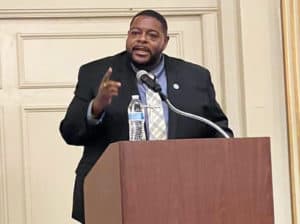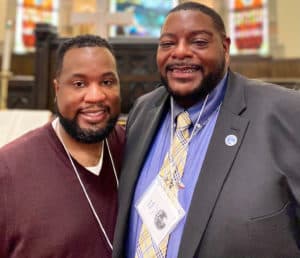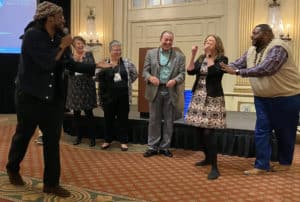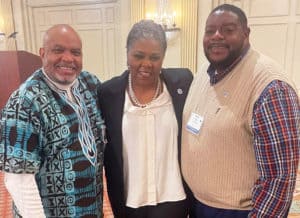CHHSM’s Doyle to Deliver Sermon at Opening Worship for UCC General Synod

By Maic D’Agostino. Reprinted by permission from UCC News, Nov. 15, 2022.
Just days into his new job, Jamar Doyle learned he could be preaching at the United Church of Christ’s 34th General Synod.
In February, the UCC’s Council for Health and Human Service Ministries named Doyle its new president and CEO. Then in March, as usual, CHHSM held its Annual Gathering, thrusting Doyle immediately into the spotlight.
In his opening remarks at the March meeting, Doyle acknowledged his newness to the role amid his hope for CHHSM’s future. Like many industries, health and human service providers have needed to reevaluate how they do ministry in the wake of the COVID-19 pandemic. Doyle made it clear that the path forward must be a joint venture between CHHSM and its 69 member agencies.
“Our work is to identify that vision together, and united we will find ways to meet these difficult challenges,” he said during his speech.
After his remarks, Doyle was approached by UCC Associate General Minister and General Synod Administrator the Rev. Karen Georgia Thompson.
“I must have said something right, because after those comments, she came up to me … and said, ‘That wasn’t really a speech; you were preaching. And you’re going to preach at General Synod,’” Doyle recalled.
At first, he wasn’t sure if Thompson was serious. But it’s now been confirmed — Doyle will offer the sermon during General Synod’s opening worship on Friday, June 30, 2023, in Indianapolis.
Registration will open in early January at the General Synod website. Registered visitors, like all delegates, will have access to worship services as well as the Synod’s many exhibits and business sessions. General Synod runs June 30 through July 4.
Faith and Community
Doyle’s path to Synod’s pulpit began with his religious and geographic background. Growing up in the African Methodist Episcopal Zion Church, he asserted that faith and spirituality have always been central to his identity.
In fact, he even felt a call to ministry early in life.
“But then, as a gay, African-American male, having come up in the ’90s, it just was a different era,” he said. “And I kind of ran from that, because I felt like maybe that wasn’t a call I could pursue at that time.”
However, he added, God still led him into the “helping field.” And for Doyle, that work began with development in his own community, first and foremost.

A native of Cleveland, Doyle started his career in some of the city’s predominantly Black east side neighborhoods, such as Collinwood and St. Clair-Superior, working for community development corporations (CDCs). He eventually rose to become executive director of the Greater Collinwood CDC.
“I was fortunate that, for the 16 years I worked in community development, I really worked in the communities I grew up in,” he said.
Outside of his career, Doyle has also been active locally in a variety of initiatives. He currently serves on a commission that monitors construction projects for Cleveland schools. And he maintains his community development ties as a board member of the Ohio CDC Association.
His deep desire to serve and give back to his community stems from the roots that cultivated him.
“It really was because I live here,” Doyle said of Cleveland, where the UCC national setting is headquartered. “This is home; it’s where I grew up. There is, I believe, a duty to give back. But then I also think, for me, so many people in my community growing up poured into me, to help get me to where I’m at today.”
Thus, Doyle explained, he wants to “pour into” the next generation the way his community elders poured into him.
Justice and Equity
Doyle’s commitment to justice and equity also can be traced back to his roots.
“The east side of Cleveland, although it’s experiencing some rebirth and some new development in some areas, it’s not to the degree that we’re seeing on the west side, for a lot of racial and socioeconomic and political reasons,” he said.
Like many places, Doyle noted, there are large disparities in health, educational and financial outcomes between high- and low-income areas. Cleveland isn’t alone in experiencing these disparities. That’s why, Doyle stressed, these places need community-centered development.
“Development’s not just physical, bricks-and-mortar development, but also human capital and building the spirit within our communities, too,” he said.
To Doyle, developing human capital looks like equity.
“When we look at how we invest — be it in schools, be it in resources — it [should be] equitable,” he said. “For instance, if we’re talking about youth, [make sure] that they truly do have the resources and opportunities to succeed, whatever their path may be. And we know that that often is not true in impoverished areas, be they urban or rural.
“To me, it’s just making sure that you do not receive lesser outcomes just based on the zip code in which you live,” he said. “And we know that that is an issue across the United States.”

‘The Power of Love’
His belief in equity for all communities is part of what drew Doyle to CHHSM.
While he may not be involved in direct service, the organizations that he and CHHSM work with certainly are. And those services offer something Doyle believes is needed now more than ever: love.
“My favorite chapter or verse of the Bible is 1 Corinthians 13, where it talks about the power of love and that, in essence, love never fails,” he said. “And so, my leadership style and really how I approach a lot of things in life is through that leading through love.”
Although people may think of love as “squishy and not really tangible,” Doyle explained that the hard work of loving people in difficult situations is concrete and real. And that’s the kind of love he sees at CHHSM.
“I recognize that the work our CHHSM agencies are doing is an act of love,” he said, whether it’s working with older adults who need affordable housing, people who are houseless, or youth in need of support. “At CHHSM, we like to say we are Christ’s hands and feet.”
Because of this, the opportunity to lead CHHSM excited Doyle in a way he said he hadn’t felt in a long time.
Of course, there’s plenty of overlap with Doyle’s background in community development and neighborhood engagement. But he also relishes a work environment with a direct connection to his spirituality and faith.
“It really has been an opportunity to bring my full self to work,” he said.

Raising Awareness
If preaching at Synod makes more congregations aware of CHHSM’s work, Doyle will be pleased.
“We have to work on our brand awareness, particularly within the church, within the UCC,” he said.
Many UCC members — and even pastors or conference ministers — may not be fully aware of the scope and scale of services that CHHSM agencies offer, Doyle noted.
“You could say that we are representing the church in our efforts to heal and to care for and to create a more caring, just and compassionate world,” he said. And so, he wants churches to know about it.
So how can people learn more?
One obvious way is to visit the CHHSM website. But Doyle also suggested intentional participation in Health and Human Services Sunday, usually observed on the last Sunday in January.
“We’d love for someone to find a local CHHSM agency and see if there’s a way to volunteer,” he said. “But if it’s just raising that awareness … that’s good enough, too. Just to be aware that we are out there, and we are working on behalf of the United Church of Christ to be that light in all of our communities across the country.”
For his part, although he’s been on the job for less than a year, Doyle already feels connected.
“I have been really excited about the welcome I’ve received across the CHHSM family, across the UCC family in general,” he said. “It really has been exceptional.”
Join Our Mailing LIst
"*" indicates required fields
Follow on Facebook
Bethany Children’s Home Hosts Annual Summer Concert Series with Unique Fundraising Twist - CHHSM
www.chhsm.org
Bethany Children’s Home in Womelsdorf, Pa., is hosting its annual Summer Concert Series, but this time with a special mission in mind: all proceeds will help build a new outdoor recreational complex...